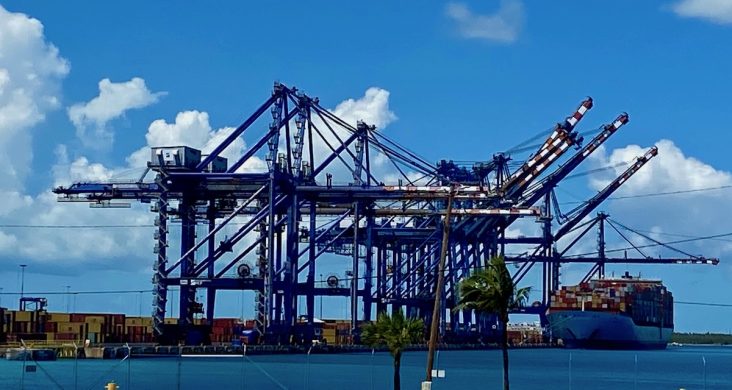NRF: Retail product import growth to remain muted this year
by March 8, 2023 2:45 pm 423 views

A cargo ship sits at the Port of New Orleans.
The National Retail Federation (NRF) said it expects import cargo volume to rebound this month slowly, but overall the gains are expected to be small through mid-summer, according to data provided by Hackett Associates.
February marked the lowest levels of cargo volume since the beginning of the pandemic in 2020, according to the NRF.
“There are many uncertainties about the economy, but we expect imports to show modest gains over the next several months,” said Jonathan Gold, NRF vice president of supply chain and customs policy. “Growth is a positive sign, but levels are still far below normal, and retailers will remain cautious as they work to keep inventories in line with consumer demand.”
U.S. ports covered by Global Port Tracker handled 1.81 million 20-foot containers in January, the latest month for which final numbers are available. That was down 16.5% year over year but up 4.4% from December for the first month-over-month increase since last August.
NRF said the ports have not yet reported February numbers, but Global Port Tracker projected that the month dropped to 1.56 million containers, down 13.6% from January and down 26.2% from a year earlier. That would make it the slowest month since 1.53 million containers in May 2020, when many factories in Asia and most U.S. stores were closed due to the COVID-19 pandemic. Since the beginning of the pandemic, only the 1.51 million containers recorded in February 2020 and 1.37 million containers in March 2020 have been lower.
“Retailers are maintaining reduced inventories in anticipation of rebuilding with new seasonal stock once they have a clearer take on expected levels of consumer spending,” Hackett Associates Founder Ben Hackett said. “While import volumes remain low, the tight labor market and strong wages are helping consumers absorb the impact of inflation and continue to spend.”
Walmart Chief Financial Officer John Rainey said this week at the Raymond James Investor Conference the retail giant’s inventory levels at the end of the final year were flat.
“We feel like we’re in a much, much better position with our inventory relative to where we were a quarter ago, but certainly relative to nine months ago, our inventory level was flat at year-end and, actually, down 3% in the U.S.,” he said.
Rainey also said higher-priced discretionary categories such as electronics, home and apparel are still seeing higher-than-normal inventory levels. He said there is a lot of uncertainty with consumer resilience. Walmart has issued earnings guidance for this fiscal year that is lower than actual earnings in the previous fiscal year.
Home Depot also forecast flat profits for this year, while Target forecasted muted growth amid continued discounts to try and woo shoppers to make more non-discretionary purchases. With respect to inventory, Target CEO Brian Cornell said the retailer is “pleased that our business delivered comparable sales growth in the fourth quarter and entered the new year in a very healthy inventory position thanks to discounting.”
NRF said while retail import cargo is expected to climb above the February lows, the overall volume is still forecast to be down year-over-year. Hackett forecasts March import volume to be 1.74 million containers, down 25.9% from a year ago, and April cargo is expected to decline 17.2%. The decline is expected to continue falling 19.7% in May and 11.5% in June.
Hackett said declines in retail imports should start to level off in the back half of the year. For the first half of 2023, Hackett expects retail cargo import volume to decline 19.5% from the same period last year.
